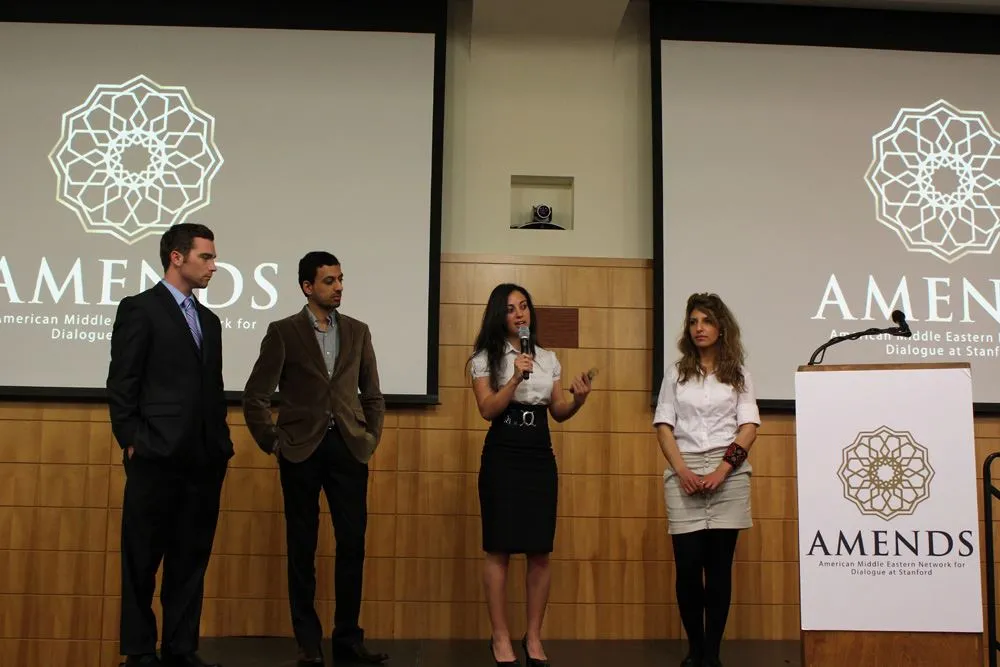Table of Contents
Bringing people together from across academic, political, and cultural backgrounds, the AMENDS conference was born out of the ambitious goals of creating, as its website states, “lasting solutions to global problems and a network of the most promising change agents in the United States and MENA [Middle East/North African] region.”
Although AMENDS is only in its inaugural year (founded last year by Elliot Stoller ’13 and Khaled Alshawi ‘13), the conference raises an interesting set of questions to consider. For starters, how well can it be at providing long-lasting discussions and solutions? Will AMENDS fulfill its idealistic aspirations? Does AMENDS go beyond one single conference to providing a lasting network of activists creating change?
The answer, it appears, depends not on the conference itself, but instead on the delegates gathered. As Matthew Colford ‘14, Director of American Outreach for AMENDS, articulates “The conference is only a small piece of this mission. It is obviously a crucial part as it allows the delegates to interact on a personal level and establish relationships.”
Boasting delegates from a host of different disciplines—from conflict resolution and social/human development to technology and media, the AMENDS conference seeks to provide a medium to introduce young activists in forging connections and solving the problems of the Middle East. As Colford explains, the burden of success is on the delegates themselves, as they are the ones who “take the initiative … seek advice from other delegates … and treat their projects with incredible professionalism and resolve.”
In this sense, AMENDS follows in the footsteps of FACES (Forum for American-Chinese Exchange at Stanford) and SURF (Stanford U.S.-Russia Forum), two similar organizations that host annual conferences. Indeed, the SURF and FACES conference provide an interesting lens to view AMENDS. Given the fact that both FACES and SURF are older—FACES was founded in 2001 and SURF in 2008—and that both also strive to create a network of student delegates, the two organizations can offer interesting insight into the potential successes and failures of AMENDS.
On a basic level, the comparison points between SURF, AMENDS, and FACES are clear. All are student-run organizations, have an international mission to foster dialogue among “future leaders,” and all have annual conferences as a cornerstone of their initiatives. As part of its program, SURF includes a five-day stint in Moscow in the autumn, a year-long research project on a topic in US-Russia relations, as well as a weeklong capstone conference at Stanford with interactive workshops, presentations, and networking events. The cornerstone of FACES is its annual forum of two week-long conferences, one held at Stanford and one in China that both bring together 40 students from universities in both countries.
Although SURF and FACES deal with bilateral relations, whereas AMENDS is about an entire region, the crux of each is clearly similar. As Colford states, “I think the difference in bilateral versus regional relationships doesn’t make anything harder or easier necessarily, only much different. Ultimately, AMENDS is dealing with over 20 countries which all have unique cultures.”
Just as AMENDS shares with FACES and SURF an admirable commitment to global collaboration and networking, it also shares with these conferences a crucial question. Simply put, is bringing people together enough?
On the one hand, AMENDS and its Stanford counterparts appear idealistic and well-intentioned, though ill-equipped to handle the gargantuan and pressing issues currently plaguing world leaders. Indeed, the conferences main role appears at first glance to be that they provide a glimmer of hope for the future, designed not to create immediate, concrete solutions to human rights concerns in China to conflict in the Middle East but instead to create the potential for a better future.
Indeed, FACES VP of Recruiting Yibai Shu ‘14 points out that FACES is “definitely not a panacea to solve all U.S.-China related problems,” And, as the FACES website states, “Delegates are selected for their potential to shape U.S.-China relations as future leaders,” with the use of the words “potential” and “future” offering a telling hint of the aspirational nature of these conferences.
Beyond the idealism and rhetoric of global community, however, is an awareness among all three conference programs of the importance of identifying definite metrics of success. As SURF President Lindsay Funk ‘13 states, “I think SURF’s success will be measured by how many of our relationships endure beyond the afterglow of the program and remain in place even when our delegates rise to leadership positions in their respective countries.”
Even more importantly, the present value of networking should not be underestimated. “The fact that someone knows a political activist in Morocco or a journalist in Egypt or a water resource expert in California (all of whom are real examples from our group of inaugural delegates this year) means that his or her network can grow,” Colford explained, and this network doesn’t represent the potential for change, but actual change itself. He added, “AMENDS is not some idealist’s dream, it’s a reality.”





